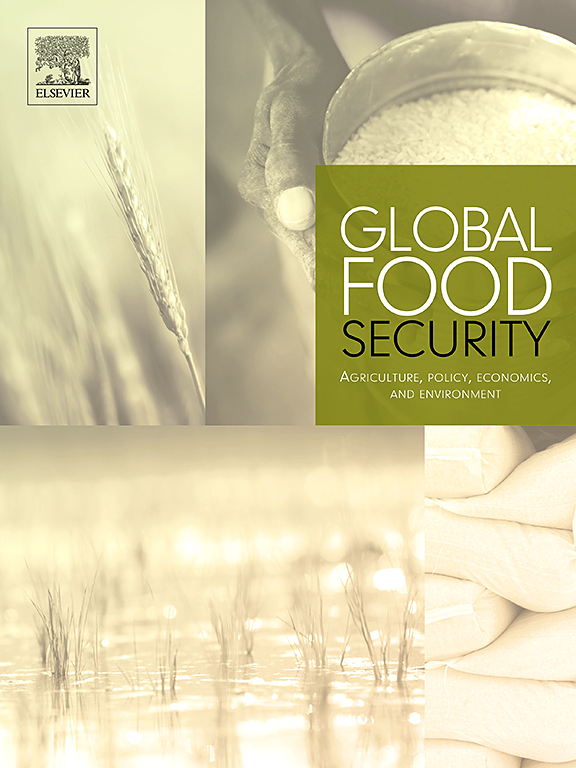过去60年农产品膳食结构的变化:时变VAR方法
IF 9.6
1区 经济学
Q1 FOOD SCIENCE & TECHNOLOGY
Global Food Security-Agriculture Policy Economics and Environment
Pub Date : 2024-12-24
DOI:10.1016/j.gfs.2024.100823
引用次数: 0
摘要
气候变化、经济放缓、冲突、短缺、需求模式变化、农业用地丧失、新时代疾病等各种全球外生冲击的频率和强度不断增加,破坏了世界各地的粮食安全和饮食。关于营养转型的共识越来越多,这为全球饮食的趋同铺平了道路。我们的研究旨在探讨全球饮食模式的重大变化及其潜在变化的合理原因。我们分析了世界银行大宗商品详细信息粉红单中171个国家63年(1960-2023年)的14种农业大宗商品数据。我们把这段时间分成六个子样本,每隔十年。我们采用时变VAR方法来研究冲击事件发生的频率,以确定显著的饮食变化。我们的研究结果表明,农产品的冲击释放模式具有周期性。所有子样本都表现出极端的溢出效应。这凸显了农产品的根本脆弱性,因为有太多不相关的事件影响着农产品生态系统。研究结果强调了“3R战略”(由牛津大学提出)的重要性,包括抵抗、恢复和恢复。重新定位,以实现整个粮食系统的稳定,以应对气候变化(区域范围);在某些情况下(具体国家)以及可持续集约化措施,以同时确保土壤效率和经济可行性。我们发现,印度尼西亚(棕榈油出口国)和巴西(花生油出口国);鸡肉)已经重新定位了自己,而中国(花生油),印度(棕榈油)撒哈拉以南非洲(鸡)抵制了这些变化,走上了复苏之路。主导农产品的模式很明显,因为出口商正在“重新定位”,而进口商正在“抵制”。恢复”。本文章由计算机程序翻译,如有差异,请以英文原文为准。

Change in dietary pattern of Agri commodities in the past six decades: Time-varying VAR approach
The burgeoning frequency and intensity of varied global exogenous shocks such as climate variability, economic slowdowns, conflicts, scarcity, changing demand pattern, loss of Agricultural land, new age diseases etc have undermined the food security and diets around the world. There is a growing consensus of nutrition transition paving its way towards convergence of global diets. Our study aims to investigate the significant changes in the global dietary pattern with the plausible reasons for the underlying changes. We analysed data for 14 Agri-commodities across 171 countries for a period of 63 years (1960–2023) from the Pink Sheet of World Bank Commodity details. We have divided the time period into six sub-samples each a decade apart. We have employed the Time Varying VAR method to study the frequency of shock emitting events to determine the significant dietary changes. Our results suggest the periodicity in shock emitting pattern of the Agri-commodities. All the sub-samples exhibit extreme spillover effect throughout. This underscores the fundamental vulnerability of the Agri-commodities, as far too many uncorrelated events impact the Agri-commodity ecosystem. The results highlight the importance of the ‘3R Strategy’ (suggested by the University of Oxford) consisting resist, recover & reorient for achieving stability in the overall food systems against climate change (region wise & for some cases country specific) as well as the measures of sustainable intensification to ensure soil efficiency and economic viability simultaneously. We found, Indonesia (an exporter of Palm Oil) and Brazil (an exporter of Groundnut Oil & Chicken) have reoriented themselves, whereas China (for Groundnut Oil), India (for Palm Oil) & Sub-Saharan Africa (for Chicken) have resisted the changes and on path of recovery. The pattern of dominating Agri commodities is evident, as the exporters are ‘reorienting’ whereas the importers are ‘resisting & recovering’.
求助全文
通过发布文献求助,成功后即可免费获取论文全文。
去求助
来源期刊

Global Food Security-Agriculture Policy Economics and Environment
FOOD SCIENCE & TECHNOLOGY-
CiteScore
20.90
自引率
3.40%
发文量
69
期刊介绍:
Global Food Security plays a vital role in addressing food security challenges from local to global levels. To secure food systems, it emphasizes multifaceted actions considering technological, biophysical, institutional, economic, social, and political factors. The goal is to foster food systems that meet nutritional needs, preserve the environment, support livelihoods, tackle climate change, and diminish inequalities. This journal serves as a platform for researchers, policymakers, and practitioners to access and engage with recent, diverse research and perspectives on achieving sustainable food security globally. It aspires to be an internationally recognized resource presenting cutting-edge insights in an accessible manner to a broad audience.
 求助内容:
求助内容: 应助结果提醒方式:
应助结果提醒方式:


